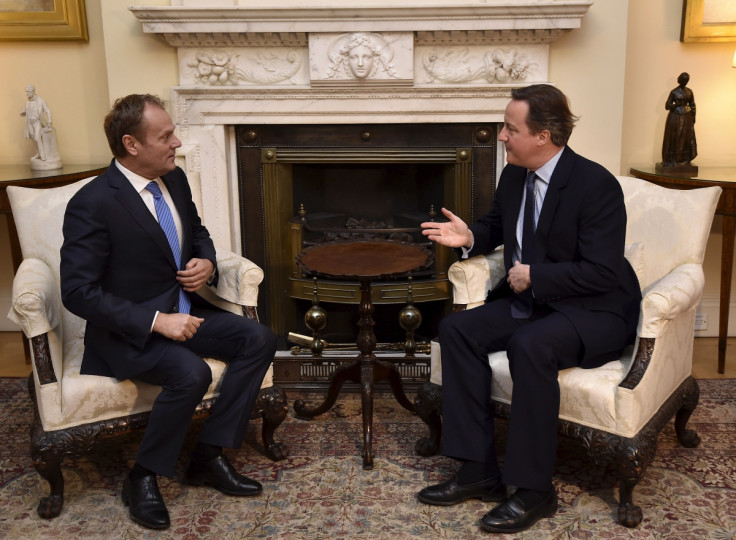EU referendum: Donald Tusk says 'outstanding issues' need to be resolved before summit

David Cameron's hopes for the UK to hold a referendum on its membership of the EU this summer (2016) appear a little less fanciful now than they did 24 hours ago when European Council President, Donald Tusk left a Downing Street dinner without hanging around for dessert. Following intensive discussions, Tusk tweeted that a draft agreement on the UK's renegotiations will be sent to all 28 member states at 11am GMT Tuesday (2 Feb) and could be ratified at the summit on 18/19 February, meaning the referendum might be as early as 23 June.
Cameron – who is keen to hold the referendum early so it does not dominate the agenda for the rest of his time in office – spent the day with Tusk to hammer out a draft agreement based on the proposal that "emergency brake" legislation be made available to the UK if migrants become a drain on the economy. The EU wanted the brake to be enforceable for a maximum of four years, but Cameron wants it to be made available on an indefinite basis.
That was one sticking point, the other being how soon the UK could implement the brake following a referendum – assuming voters choose to remain in the bloc. Both sides now seem to have agreed on something they can take to their critics, though Tusk admitted that "outstanding issues" still need to be addressed before the summit.
Tomorrow around noon I will table proposal for a new settlement for #UKinEU. Good progress last 24 hours but still outstanding issues
— Donald Tusk (@eucopresident) February 1, 2016
The draft proposal will be circulated among the 28 member states in the hope they can agree to the terms at the summit. At 5.44pm (GMT) this evening (1 February), Tusk Tweeted: "Tomorrow around noon I will table proposal for a new settlement for #UKinEU. Good progress last 24 hours but still outstanding issues."
One of these "outstanding issues" may be getting all the other members of the Union to agree to the UK's proposals – particularly those with large numbers of migrants in the UK. Poland's Foreign Minister Radek Sikorski told the BBC it would be difficult for the Polish government to approve the brake measure.
Cameron faces an equally tough task in trying to persuade the many eurosceptics within the Conservative Party and beyond that the brake will be sufficient to dissuade migrants from entering the UK to claim benefits. However, simply getting Tusk to send out any sort of proposal that limits benefit payments to migrants will probably be spun as a minor triumph.
© Copyright IBTimes 2025. All rights reserved.






















